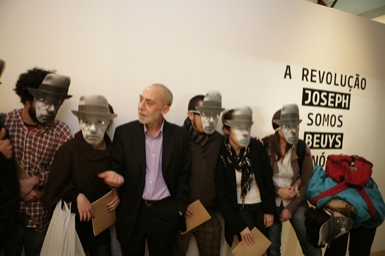General Curatorship by Solange Farkas
Guest Curator Antonio dʼAvossa
2010 | Sesc Pompeia, São Paulo, SP, Brazil
2011 | Museum of Modern Art, Salvador, BA, Brazil
The communications project that underlies Joseph Beuys’ seminal work provides the backdrop to the retrospective, which was seen by sixty thousand people at SESC Pompeia and the Museum of Modern Art of Bahia in 2010. Curated by Antonio d’Avossa, a contemporary art history professor at the Brera Academy, in Milan, and featuring Solange Farkas as the curator general, the exhibition brought together 260 posters, multiples, and videos in a program designed to highlight the diversity of strategies used by Beuys and the importance of the word to his oeuvre. The Educational Curatorial Program proposed activities based on the Free International University, which Beuys established in the 1970s to promote reflection on the present and future of society.














